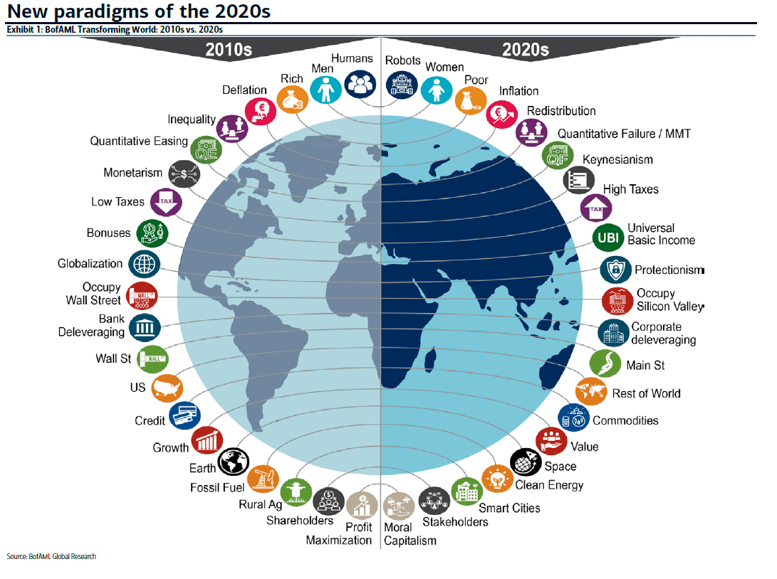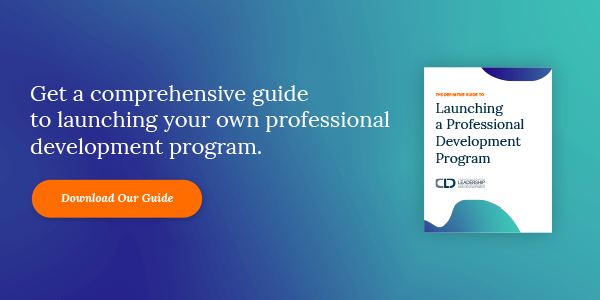 Corporate responsibility is shifting from pleasing shareholders to upskilling for stakeholders' sake. And the signs have been there all along. According to a report by McKinsey & Company, the majority believes the system is failing them and current leaders lack credibility. People are more fearful of job loss than ever. In that report, 59% of employees fear job loss due to not having the training and skills necessary. This is higher than the fear of job loss due to automation (55%) or trade policies and tariffs hurting the company (57%). It should be no surprise that people are concerned about themselves. So what's a company to do now?
Corporate responsibility is shifting from pleasing shareholders to upskilling for stakeholders' sake. And the signs have been there all along. According to a report by McKinsey & Company, the majority believes the system is failing them and current leaders lack credibility. People are more fearful of job loss than ever. In that report, 59% of employees fear job loss due to not having the training and skills necessary. This is higher than the fear of job loss due to automation (55%) or trade policies and tariffs hurting the company (57%). It should be no surprise that people are concerned about themselves. So what's a company to do now?
Corporate Responsibility in the 2010s
To develop successful business strategy in the 2020s, you first have to look at how we got here. Take a look at this graphic below from a Merrill Lynch Thematic Investing report (Nov 2019). As we move further into the next decade, we see a shift in paradigms. We will witness more change in the next 10 years than we've seen in the last 100.

As you can see, many of the paradigms from the 2010s are what we know worked, for better or worse. These are some of the strategies we relied on to maximize profit in our business endeavors.
Globalization
The free movement of labor, goods, and capital around the world was a huge success in the 2010s. At the height of the decade Fortune heralded these businesses for being more "global than ever". Now, across the world, we're seeing waves of rejections to globalization. According to the Merrill Lynch report, we've reached peak globalization.
Now more than ever the localization of our businesses, our economies, and even our Google searches is on the rise. When the data tells us that people are scared of losing their jobs not because of governmental policies they feel they have no control over, they are worried because they feel their direct leaders don't believe they have the skills to do the job. The sentiments are coming a lot closer to home and people are saying take care of me.
Humans
The human power that was critical to certain tasks in the 2010s is simply not going to be needed as the shift to artificial intelligence comes to full scale this decade. Robotic Process Automation has already entered the government space through the DOD's Joint AI Center. But without hyperlinking ad nauseam to all the reports about jobs being lost to AI, I started to think about what the 2020s solution would like in this new paradigm.
Amazon, a company leading the world in robotic process automation, has pledged to upskill 100,000 U.S. employees for in-demand jobs by 2025. Industry Week reported that at Tesla, Elon Musk admitted that a heavy reliance on robotic automation was partly to blame for delays in manufacturing. "Yes, excessive automation at Tesla was a mistake," he said. "Humans are underrated. We had this crazy complex network of conveyor belts. And it was not working."
In the 2020s it will not be robots or humans, successful businesses will find ways to have robots and humans. A report by Capgemini shows that upskilling workers has the potential to save $1.2 billion over 3 years. Even as robots and automation put certain jobs at risk, many companies are starting to see the social responsibility to taking care of their own workers.
Shareholders
The current economic climate of "maximizing shareholder value" really began in the 1980s when companies' lagging stock prices were susceptible to takeovers or disgruntled shareholders too willing to sell. What followed was a new focus of executives and directors towards profits and share prices. Due to the rise in short-term trading, quarterly investment returns, and quarterly earnings you saw the focus of corporate responsibility towards pleasing shareholders.
Now, a group of nearly 200 chief executives discussed how shareholder value is no longer everything. The paradigm is shifting towards stakeholders.
My Top 2 Executive Lessons from 2010s
Upskilling the Stakeholders
Who are the stakeholders?
The stakeholders of your company are society. Leaders need to embed society's concerns into their business strategy. Employers and leaders, you have to think about the long term consequences of your decisions. If you believe at all that customers drive value, then this is something you might want to think deeper about your purpose and societal impact. The employees are what make the customer experience win or lose.
"Society is demanding that companies, both public and private, serve a social purpose. To prosper over time, every company must not only deliver financial performance, but also show how it makes a positive contribution to society." - Larry Fink, CEO BlackRock, January 2018
Society is where your company draws its talent pool. That talent pool will be impacting your business and your customers.
How do you make stakeholders happy?
Companies did an incredible job giving returns to shareholders in the 2010s. Now, the ones that give returns to stakeholders are the ones that will prevail. Upskilling is the key to pleasing your stakeholders and ultimately your business success.
What percentage of your budget is training? Not just training your customers, but training your employees. Have you asked your employees if they feel their job is at risk due to lack of skills? How many of your employees fall into this bucket? How many of your coworkers fall into this same bucket?
Bill Blase, Senior EVP of human resources, AT&T, said back in March 2018, "it's important for companies, at the senior level, to engage and retrain workers rather than constantly going to the street to hire."
Why can’t every company allow each employee to take a class for whatever it is they want, within a reasonable budget? Why does it have to be job related? This isn’t the 1900s. People don’t do the same job for a lifetime. For your next strategic need, you could have someone on staff who is already incredibly passionate about it and, although not skilled yet, will have the capacity for it. People will have new required job skills every 3-5 years very soon with the speed of technology adoption. For some, an employee certification already needs to be updated every 3-5 years just to prove someone still has those skills.
Why not tweak the job specific requirement for employee chosen training to company specific, strategic alignment, vision or purpose fulfillment? A finance person doesn’t need to take underwater basket weaving. I am not arguing that. But, let’s get real here. What if any employee development is approved for employees as long as it aligns with your core purpose, mission or values. That sounds like building loyalty to me.
Why not allow anyone to take any class they want as it could relate to the business or individual growth, and provide them a mentor within the company to work with? Maybe a sales person wants to understand contracts or finances better. Pair them up with someone from finance or operations.
Upskilling Options
So many employee training program options out there. I get every one is different. But given the data and trends away from globalization people are going to want training from a local trusted resource. A live instructor will always be more impactful than eLearning. You wouldn't pay for college to go spend 4 years in the library, without professor and classmate interaction and hands on immersive learning, would you?
I would like to see more businesses adopt this methodology: Forum experience with a facilitator and/or a coach. The U.S. Chamber of Commerce Foundation found that hiring managers report skills matter more than degrees. This is important, but the biggest mistakes I see? One and done versus continuous.
The value of training compounds over time. Do professional athletes stop practicing as they get higher and higher status or levels of success? The exact opposite. Why do we stop in our companies if we know results and value have a compounding effect through continuous training? Mentorship and facilitation will be key versus command and control.
I don’t want to hear from everyone that people are a company’s #1 greatest asset unless they truly are. Show me your training budget versus your R&D budget.
Remember, you don’t rise to the occasion. You fall to your highest level of preparation.


